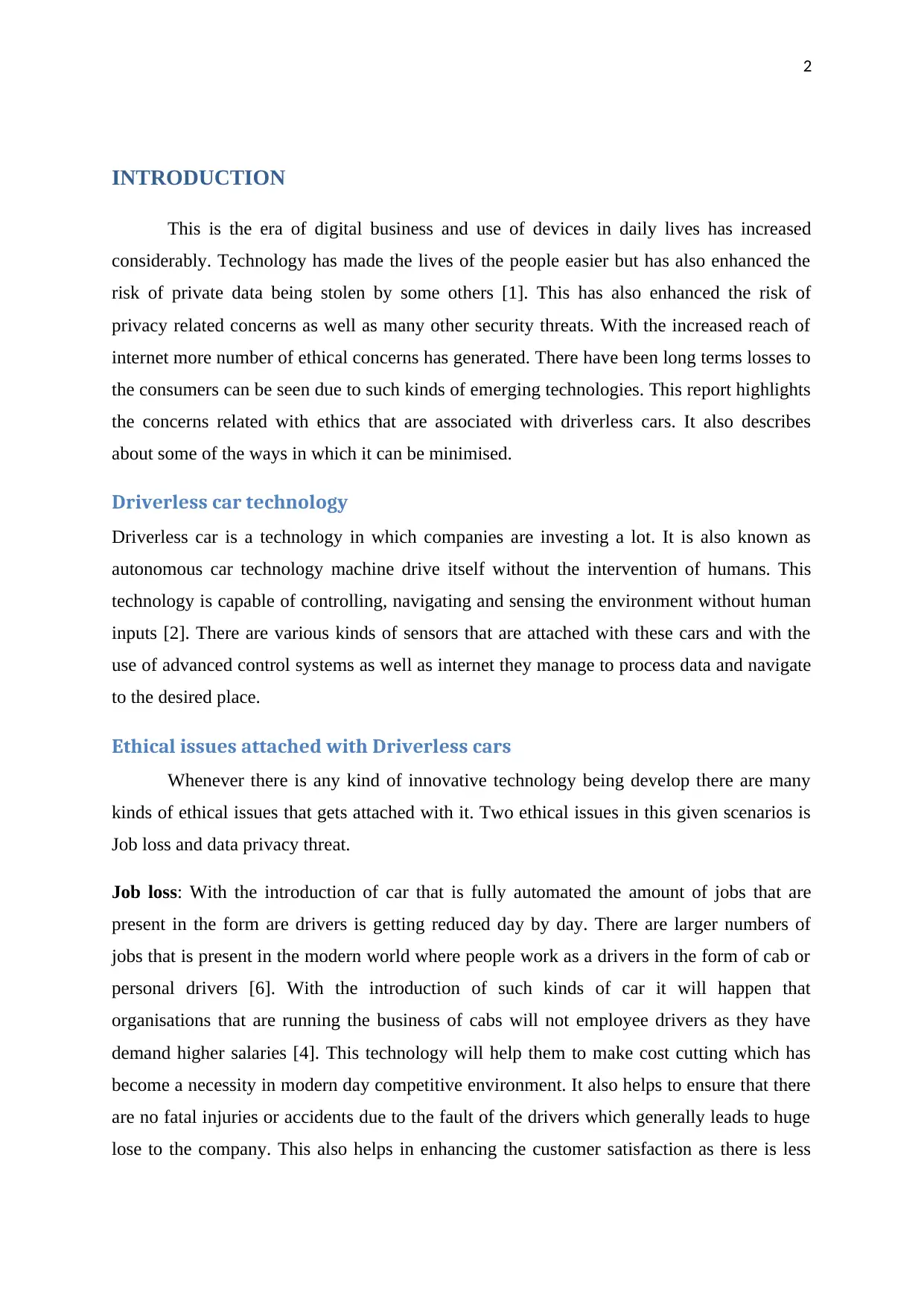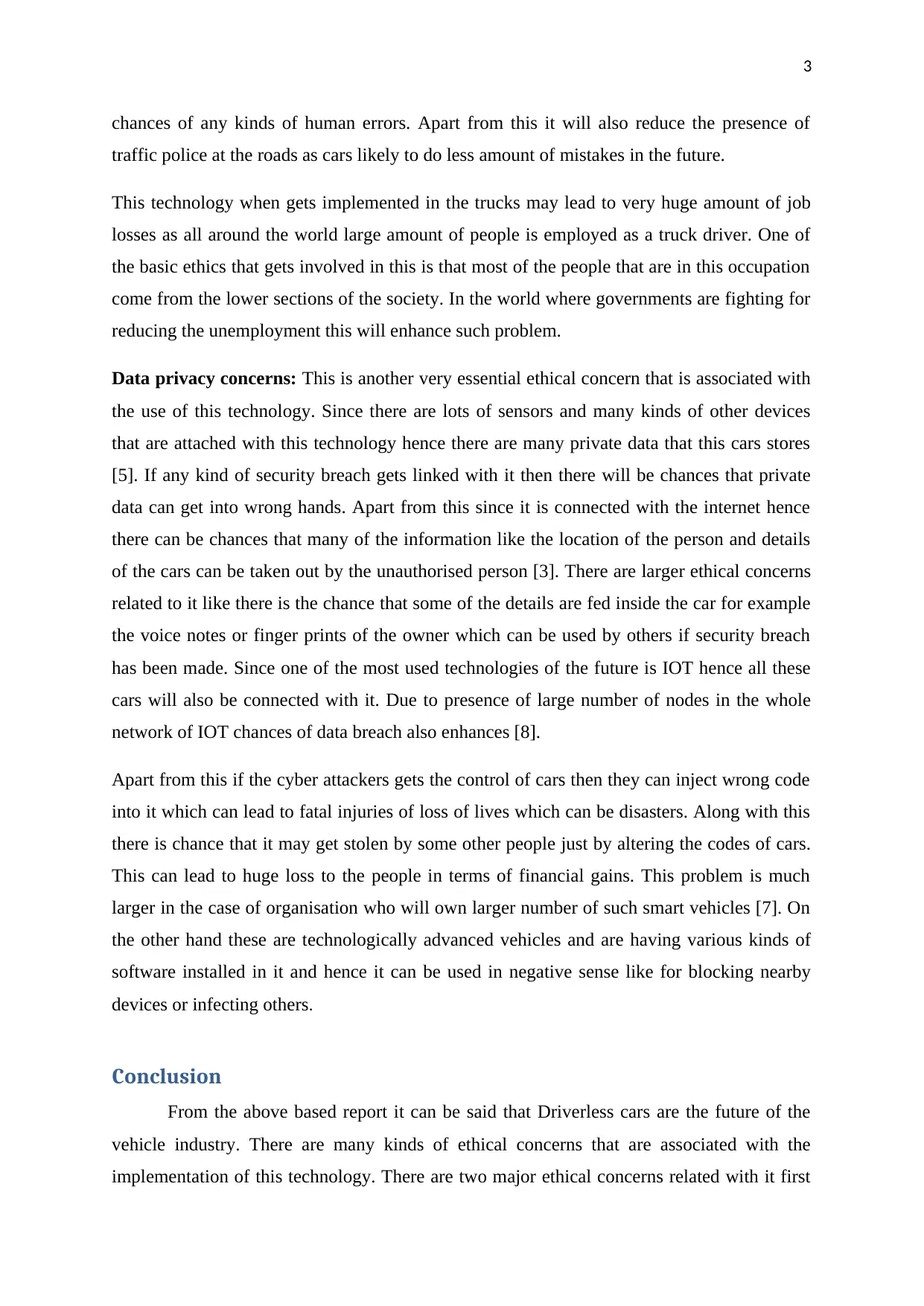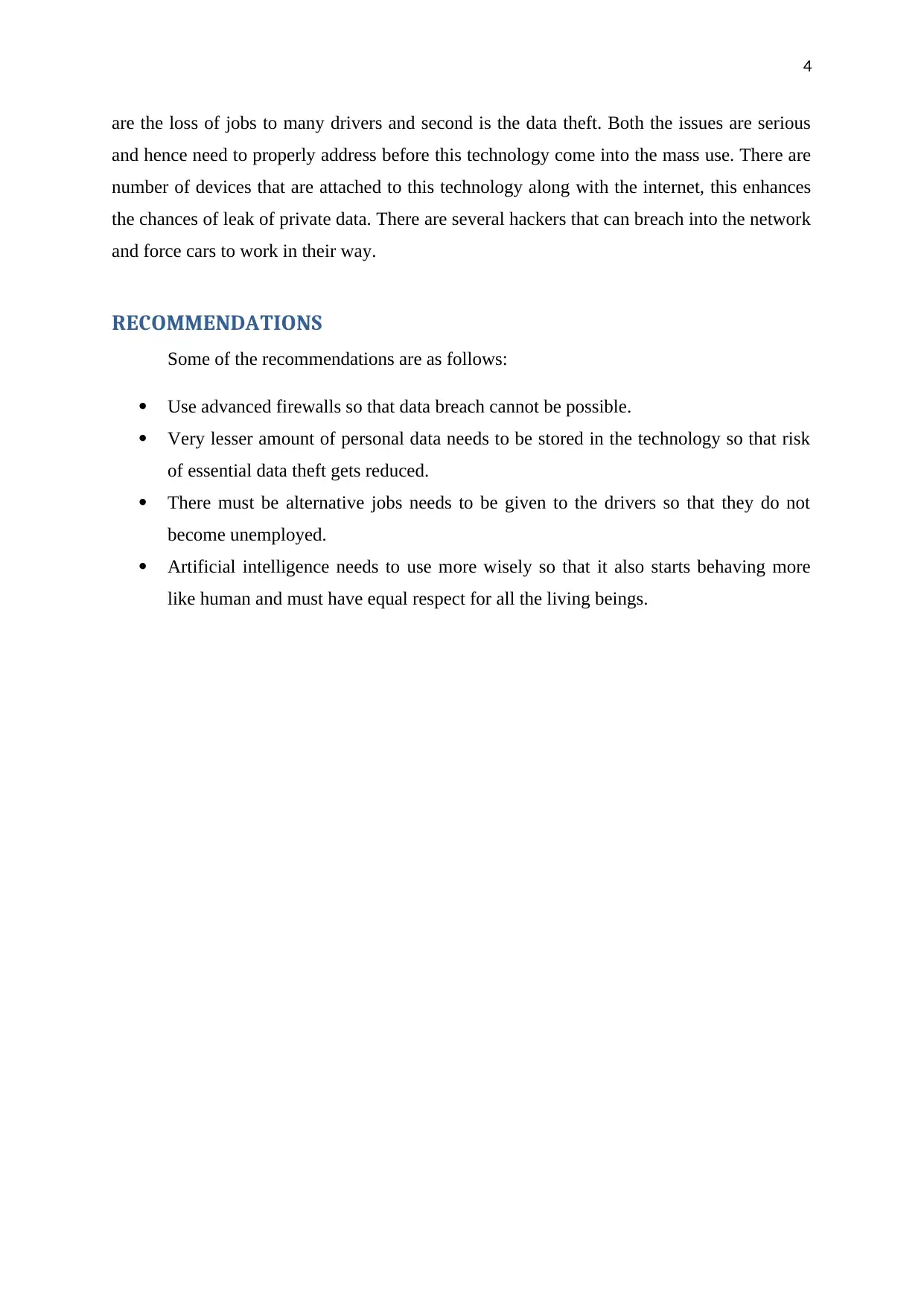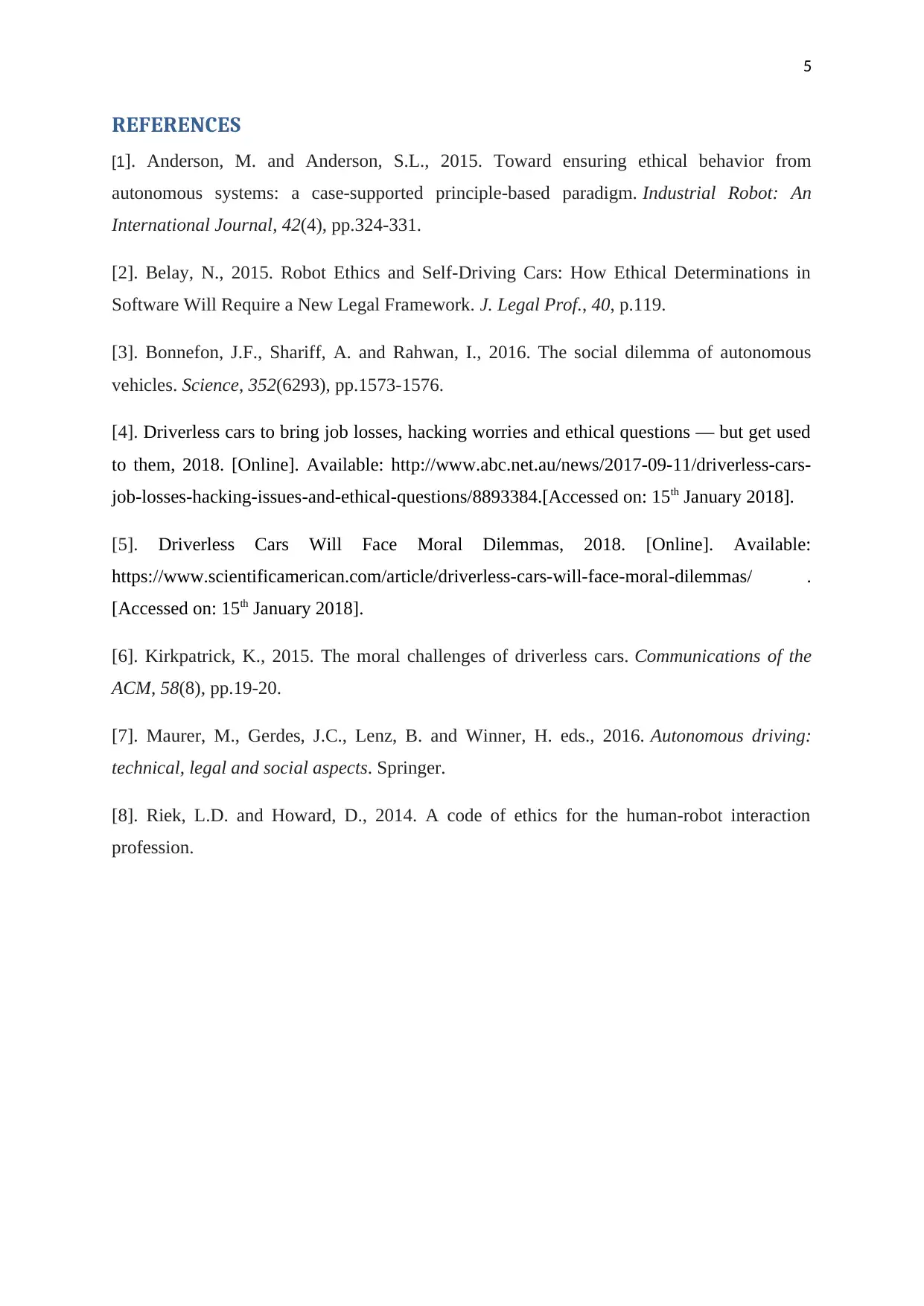Ethical Implications of Driverless Car Technology: A Report
VerifiedAdded on 2020/05/28
|6
|1402
|165
Report
AI Summary
This report explores the ethical implications of driverless car technology, a rapidly advancing field with significant societal impacts. The report identifies two primary ethical concerns: job displacement due to automation and data privacy threats stemming from the collection and storage of sensitive information by autonomous vehicles. It delves into the potential for widespread job losses in the transportation sector, particularly for drivers, and discusses the risks of data breaches and misuse of personal information stored within these vehicles. The report also highlights the potential for cyberattacks and the need for robust security measures to prevent malicious control or data theft. Recommendations include the implementation of advanced firewalls, minimizing the storage of personal data, providing alternative employment opportunities for displaced workers, and promoting ethical AI development that prioritizes human well-being. The report concludes that while driverless cars represent the future of the automotive industry, careful consideration and proactive measures are crucial to mitigate the ethical challenges associated with their widespread adoption.

NETWORK
MANAGEMENT IN
ORGANISATION
MANAGEMENT IN
ORGANISATION
Paraphrase This Document
Need a fresh take? Get an instant paraphrase of this document with our AI Paraphraser

1
Contents
Driverless car technology..................................................................................................................2
Ethical issues attached with Driverless cars.......................................................................................2
Conclusion.............................................................................................................................................3
RECOMMENDATIONS............................................................................................................................4
REFERENCES..........................................................................................................................................6
Contents
Driverless car technology..................................................................................................................2
Ethical issues attached with Driverless cars.......................................................................................2
Conclusion.............................................................................................................................................3
RECOMMENDATIONS............................................................................................................................4
REFERENCES..........................................................................................................................................6

2
INTRODUCTION
This is the era of digital business and use of devices in daily lives has increased
considerably. Technology has made the lives of the people easier but has also enhanced the
risk of private data being stolen by some others [1]. This has also enhanced the risk of
privacy related concerns as well as many other security threats. With the increased reach of
internet more number of ethical concerns has generated. There have been long terms losses to
the consumers can be seen due to such kinds of emerging technologies. This report highlights
the concerns related with ethics that are associated with driverless cars. It also describes
about some of the ways in which it can be minimised.
Driverless car technology
Driverless car is a technology in which companies are investing a lot. It is also known as
autonomous car technology machine drive itself without the intervention of humans. This
technology is capable of controlling, navigating and sensing the environment without human
inputs [2]. There are various kinds of sensors that are attached with these cars and with the
use of advanced control systems as well as internet they manage to process data and navigate
to the desired place.
Ethical issues attached with Driverless cars
Whenever there is any kind of innovative technology being develop there are many
kinds of ethical issues that gets attached with it. Two ethical issues in this given scenarios is
Job loss and data privacy threat.
Job loss: With the introduction of car that is fully automated the amount of jobs that are
present in the form are drivers is getting reduced day by day. There are larger numbers of
jobs that is present in the modern world where people work as a drivers in the form of cab or
personal drivers [6]. With the introduction of such kinds of car it will happen that
organisations that are running the business of cabs will not employee drivers as they have
demand higher salaries [4]. This technology will help them to make cost cutting which has
become a necessity in modern day competitive environment. It also helps to ensure that there
are no fatal injuries or accidents due to the fault of the drivers which generally leads to huge
lose to the company. This also helps in enhancing the customer satisfaction as there is less
INTRODUCTION
This is the era of digital business and use of devices in daily lives has increased
considerably. Technology has made the lives of the people easier but has also enhanced the
risk of private data being stolen by some others [1]. This has also enhanced the risk of
privacy related concerns as well as many other security threats. With the increased reach of
internet more number of ethical concerns has generated. There have been long terms losses to
the consumers can be seen due to such kinds of emerging technologies. This report highlights
the concerns related with ethics that are associated with driverless cars. It also describes
about some of the ways in which it can be minimised.
Driverless car technology
Driverless car is a technology in which companies are investing a lot. It is also known as
autonomous car technology machine drive itself without the intervention of humans. This
technology is capable of controlling, navigating and sensing the environment without human
inputs [2]. There are various kinds of sensors that are attached with these cars and with the
use of advanced control systems as well as internet they manage to process data and navigate
to the desired place.
Ethical issues attached with Driverless cars
Whenever there is any kind of innovative technology being develop there are many
kinds of ethical issues that gets attached with it. Two ethical issues in this given scenarios is
Job loss and data privacy threat.
Job loss: With the introduction of car that is fully automated the amount of jobs that are
present in the form are drivers is getting reduced day by day. There are larger numbers of
jobs that is present in the modern world where people work as a drivers in the form of cab or
personal drivers [6]. With the introduction of such kinds of car it will happen that
organisations that are running the business of cabs will not employee drivers as they have
demand higher salaries [4]. This technology will help them to make cost cutting which has
become a necessity in modern day competitive environment. It also helps to ensure that there
are no fatal injuries or accidents due to the fault of the drivers which generally leads to huge
lose to the company. This also helps in enhancing the customer satisfaction as there is less
⊘ This is a preview!⊘
Do you want full access?
Subscribe today to unlock all pages.

Trusted by 1+ million students worldwide

3
chances of any kinds of human errors. Apart from this it will also reduce the presence of
traffic police at the roads as cars likely to do less amount of mistakes in the future.
This technology when gets implemented in the trucks may lead to very huge amount of job
losses as all around the world large amount of people is employed as a truck driver. One of
the basic ethics that gets involved in this is that most of the people that are in this occupation
come from the lower sections of the society. In the world where governments are fighting for
reducing the unemployment this will enhance such problem.
Data privacy concerns: This is another very essential ethical concern that is associated with
the use of this technology. Since there are lots of sensors and many kinds of other devices
that are attached with this technology hence there are many private data that this cars stores
[5]. If any kind of security breach gets linked with it then there will be chances that private
data can get into wrong hands. Apart from this since it is connected with the internet hence
there can be chances that many of the information like the location of the person and details
of the cars can be taken out by the unauthorised person [3]. There are larger ethical concerns
related to it like there is the chance that some of the details are fed inside the car for example
the voice notes or finger prints of the owner which can be used by others if security breach
has been made. Since one of the most used technologies of the future is IOT hence all these
cars will also be connected with it. Due to presence of large number of nodes in the whole
network of IOT chances of data breach also enhances [8].
Apart from this if the cyber attackers gets the control of cars then they can inject wrong code
into it which can lead to fatal injuries of loss of lives which can be disasters. Along with this
there is chance that it may get stolen by some other people just by altering the codes of cars.
This can lead to huge loss to the people in terms of financial gains. This problem is much
larger in the case of organisation who will own larger number of such smart vehicles [7]. On
the other hand these are technologically advanced vehicles and are having various kinds of
software installed in it and hence it can be used in negative sense like for blocking nearby
devices or infecting others.
Conclusion
From the above based report it can be said that Driverless cars are the future of the
vehicle industry. There are many kinds of ethical concerns that are associated with the
implementation of this technology. There are two major ethical concerns related with it first
chances of any kinds of human errors. Apart from this it will also reduce the presence of
traffic police at the roads as cars likely to do less amount of mistakes in the future.
This technology when gets implemented in the trucks may lead to very huge amount of job
losses as all around the world large amount of people is employed as a truck driver. One of
the basic ethics that gets involved in this is that most of the people that are in this occupation
come from the lower sections of the society. In the world where governments are fighting for
reducing the unemployment this will enhance such problem.
Data privacy concerns: This is another very essential ethical concern that is associated with
the use of this technology. Since there are lots of sensors and many kinds of other devices
that are attached with this technology hence there are many private data that this cars stores
[5]. If any kind of security breach gets linked with it then there will be chances that private
data can get into wrong hands. Apart from this since it is connected with the internet hence
there can be chances that many of the information like the location of the person and details
of the cars can be taken out by the unauthorised person [3]. There are larger ethical concerns
related to it like there is the chance that some of the details are fed inside the car for example
the voice notes or finger prints of the owner which can be used by others if security breach
has been made. Since one of the most used technologies of the future is IOT hence all these
cars will also be connected with it. Due to presence of large number of nodes in the whole
network of IOT chances of data breach also enhances [8].
Apart from this if the cyber attackers gets the control of cars then they can inject wrong code
into it which can lead to fatal injuries of loss of lives which can be disasters. Along with this
there is chance that it may get stolen by some other people just by altering the codes of cars.
This can lead to huge loss to the people in terms of financial gains. This problem is much
larger in the case of organisation who will own larger number of such smart vehicles [7]. On
the other hand these are technologically advanced vehicles and are having various kinds of
software installed in it and hence it can be used in negative sense like for blocking nearby
devices or infecting others.
Conclusion
From the above based report it can be said that Driverless cars are the future of the
vehicle industry. There are many kinds of ethical concerns that are associated with the
implementation of this technology. There are two major ethical concerns related with it first
Paraphrase This Document
Need a fresh take? Get an instant paraphrase of this document with our AI Paraphraser

4
are the loss of jobs to many drivers and second is the data theft. Both the issues are serious
and hence need to properly address before this technology come into the mass use. There are
number of devices that are attached to this technology along with the internet, this enhances
the chances of leak of private data. There are several hackers that can breach into the network
and force cars to work in their way.
RECOMMENDATIONS
Some of the recommendations are as follows:
Use advanced firewalls so that data breach cannot be possible.
Very lesser amount of personal data needs to be stored in the technology so that risk
of essential data theft gets reduced.
There must be alternative jobs needs to be given to the drivers so that they do not
become unemployed.
Artificial intelligence needs to use more wisely so that it also starts behaving more
like human and must have equal respect for all the living beings.
are the loss of jobs to many drivers and second is the data theft. Both the issues are serious
and hence need to properly address before this technology come into the mass use. There are
number of devices that are attached to this technology along with the internet, this enhances
the chances of leak of private data. There are several hackers that can breach into the network
and force cars to work in their way.
RECOMMENDATIONS
Some of the recommendations are as follows:
Use advanced firewalls so that data breach cannot be possible.
Very lesser amount of personal data needs to be stored in the technology so that risk
of essential data theft gets reduced.
There must be alternative jobs needs to be given to the drivers so that they do not
become unemployed.
Artificial intelligence needs to use more wisely so that it also starts behaving more
like human and must have equal respect for all the living beings.

5
REFERENCES
[1]. Anderson, M. and Anderson, S.L., 2015. Toward ensuring ethical behavior from
autonomous systems: a case-supported principle-based paradigm. Industrial Robot: An
International Journal, 42(4), pp.324-331.
[2]. Belay, N., 2015. Robot Ethics and Self-Driving Cars: How Ethical Determinations in
Software Will Require a New Legal Framework. J. Legal Prof., 40, p.119.
[3]. Bonnefon, J.F., Shariff, A. and Rahwan, I., 2016. The social dilemma of autonomous
vehicles. Science, 352(6293), pp.1573-1576.
[4]. Driverless cars to bring job losses, hacking worries and ethical questions — but get used
to them, 2018. [Online]. Available: http://www.abc.net.au/news/2017-09-11/driverless-cars-
job-losses-hacking-issues-and-ethical-questions/8893384.[Accessed on: 15th January 2018].
[5]. Driverless Cars Will Face Moral Dilemmas, 2018. [Online]. Available:
https://www.scientificamerican.com/article/driverless-cars-will-face-moral-dilemmas/ .
[Accessed on: 15th January 2018].
[6]. Kirkpatrick, K., 2015. The moral challenges of driverless cars. Communications of the
ACM, 58(8), pp.19-20.
[7]. Maurer, M., Gerdes, J.C., Lenz, B. and Winner, H. eds., 2016. Autonomous driving:
technical, legal and social aspects. Springer.
[8]. Riek, L.D. and Howard, D., 2014. A code of ethics for the human-robot interaction
profession.
REFERENCES
[1]. Anderson, M. and Anderson, S.L., 2015. Toward ensuring ethical behavior from
autonomous systems: a case-supported principle-based paradigm. Industrial Robot: An
International Journal, 42(4), pp.324-331.
[2]. Belay, N., 2015. Robot Ethics and Self-Driving Cars: How Ethical Determinations in
Software Will Require a New Legal Framework. J. Legal Prof., 40, p.119.
[3]. Bonnefon, J.F., Shariff, A. and Rahwan, I., 2016. The social dilemma of autonomous
vehicles. Science, 352(6293), pp.1573-1576.
[4]. Driverless cars to bring job losses, hacking worries and ethical questions — but get used
to them, 2018. [Online]. Available: http://www.abc.net.au/news/2017-09-11/driverless-cars-
job-losses-hacking-issues-and-ethical-questions/8893384.[Accessed on: 15th January 2018].
[5]. Driverless Cars Will Face Moral Dilemmas, 2018. [Online]. Available:
https://www.scientificamerican.com/article/driverless-cars-will-face-moral-dilemmas/ .
[Accessed on: 15th January 2018].
[6]. Kirkpatrick, K., 2015. The moral challenges of driverless cars. Communications of the
ACM, 58(8), pp.19-20.
[7]. Maurer, M., Gerdes, J.C., Lenz, B. and Winner, H. eds., 2016. Autonomous driving:
technical, legal and social aspects. Springer.
[8]. Riek, L.D. and Howard, D., 2014. A code of ethics for the human-robot interaction
profession.
⊘ This is a preview!⊘
Do you want full access?
Subscribe today to unlock all pages.

Trusted by 1+ million students worldwide
1 out of 6
Related Documents
Your All-in-One AI-Powered Toolkit for Academic Success.
+13062052269
info@desklib.com
Available 24*7 on WhatsApp / Email
![[object Object]](/_next/static/media/star-bottom.7253800d.svg)
Unlock your academic potential
Copyright © 2020–2026 A2Z Services. All Rights Reserved. Developed and managed by ZUCOL.




